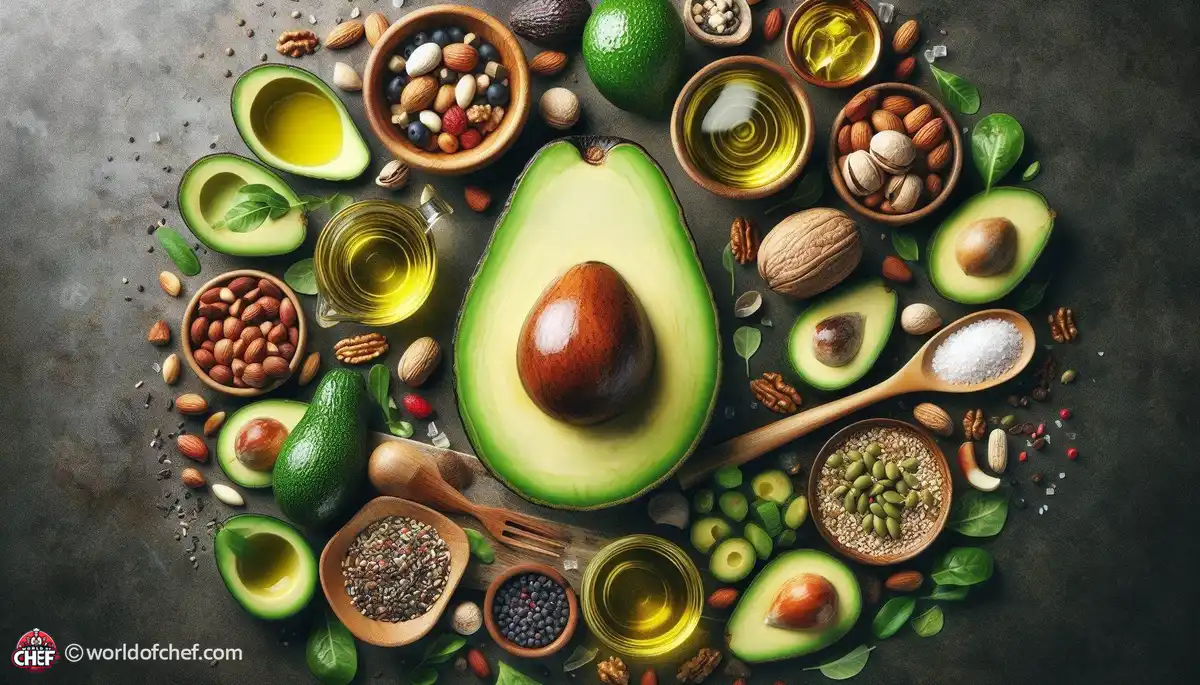
Dinner Delights: High-Fiber Recipes for Every Palate
Clarence Guido - Oct 7, 2024 - 7 min read


Know Power of Healthy Fats: Unlocked Nutritional Treasure Healthy fats represent unsung heroes of the brain, and not some buzzword of fad diets. Whenever we speak of healthy fats, one thing that pops up instantly is omega-3 fatty acids. These are commonly found in fish like salmon and walnuts, avocado, and olive oil. What's great about them is the taste, and they prove to be very essential in the proper functioning of a human brain. They are the constituents of cell membranes, a facilitator of nerve impulses, and help in the absorption of essential fat-soluble vitamins A, D, E, and K. Adding them to our diet is like putting down a solid foundation to our cognitive well-being.
While both omega-3 and omega-6 fatty acids are important to our health, the current Western diet tends to skew greatly towards the latter, from which most of our foods, especially processed ones, as well as vegetable oils, are derived. In this imbalanced ratio, there is a propensity towards inflammation, which is directly linked to many cognitive disorders. Omega-3, in contrast, is known for its anti-inflammatory quality, which balances out its counterpart. Equating both types of fats should help keep your brain going full steam and general healthy status in check.
Among the many omega-3 fatty acids, two specific ones are particularly beneficial for brain health. EPA serves as an essential factor to help in mood regulation as well as reduction of inflammation. DHA makes up the largest structural fraction of the brain and hence plays a major role in memory and cognitive functions. Using food items containing EPA and DHA can contribute notably toward healthy maintenance of one's brain, such as those Fatty Fish, i.e., salmon, mackerel, and sardines.
Our cognitive reserve-the brain's tolerance to damage, decline, or injury-is moderated by a combination of heredity, education, and lifestyle. Diet goes a long way in improving this cognitive reserve, and here, healthy fats play crucial roles. The evidence shows that diets consisting of healthy fats are a lot less associated with any risks of cognitive decline or neurodegenerative disorders like Alzheimer's. Hence, incorporating such fats in our daily food is practically a long-term investment of brain resilience.
Have you ever experienced how, after lunch, one feels as though the brain is becoming dull and not able to focus? Maybe it could be because of the diet chosen. The more unhealthy foods containing high fat, typically processed snacks and fast foods, are consumed, blood sugar increases then crashes significantly, leading to impaired thought processes. Conversely, dietary sources of healthy fats furnish the brain with a sustainable supply of energy and have been known to promote day-long mental clarity and mental focus. The next time you cave to that bag of chips, try a fistful of nuts or slice of avocado toast for the brain-boosting mood lifter.
Do you know that your gut is often referred to as your "second brain"? It is so because this organ houses a large number of serotonin in our bodies that is responsible for regulating both mood and behavior. Healthy fats help to preserve the gut and also produce serotonin. Intake of omega-3 fatty acids proves to be helpful in fighting the symptoms of depression and anxiety by maintaining a healthy balance of neurotransmitters in the brain. The next time you feel down, think about adding a serving of fatty fish or flaxseeds to your meal for a natural mood boost.
While wanting to introduce healthy fats into one's diet, it does not just have to come from fish. Introduce some nutty and seeded variations as well as some legumes to provide your brain with more diversity in the nutrients received. Try some new recipes and international dishes for some exciting and mouth-watering meals.
The way you cook your food also dictates its nutritional content. Cook in methods that preserve healthy fats. For example, bake, grill, or steam rather than deep fry or sauté with too much oil. High-quality oils, such as olive or Coconut Oil, should be used for salad dressings and sautéing since they contain beneficial fats for the brain.
Snacking does not need to be synonymous with splurging on some variety of unhealthy indulgence. Where sweet or packaged snack foods are the first lines of defense, maintain an arsenal of healthier alternatives for quick grabs like mixed nuts, seeds, or even sliced avocado. Pair with whole fruits or vegetables for a very fulfilling, and energizing, yet very cognitive snack, that can sustain you wonderfully until meals.
The symphony of nutrition is only achieved in harmony with Health Benefits derived from healthy fats-a necessity to harmonize a function in the working brain, while enhancing overall wellbeing in a long-time fashion. With mindful choices and focusing on omega-3-rich foods, we will feed our brains and nurture a resilient cognitive reserve to stand by us throughout life. The next time you're planning your meals, don't forget to add some healthy doses of fats to fuel your brain and nourish your mind.

Clarence Guido - Oct 7, 2024 - 7 min read

Lydia Timmerman - Oct 6, 2024 - 6 min read

Logan Trowbridge - Oct 6, 2024 - 7 min read

Wayne Tobar - Oct 4, 2024 - 8 min read